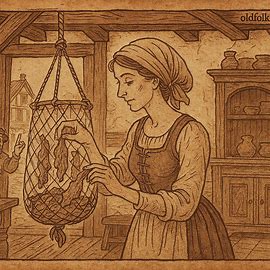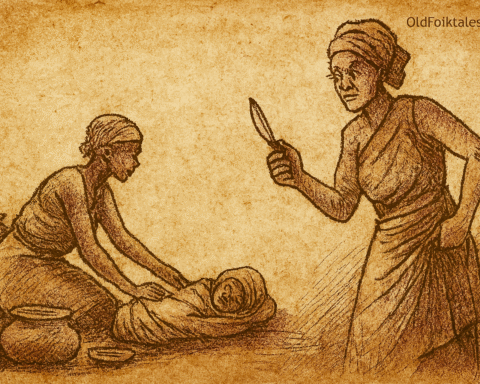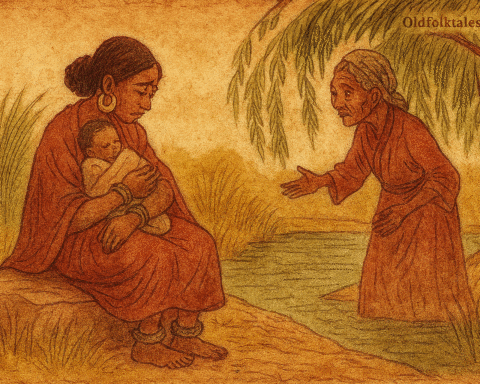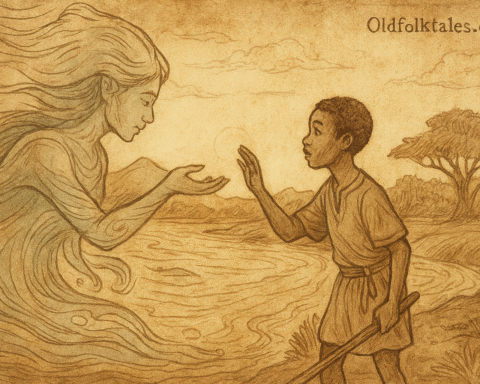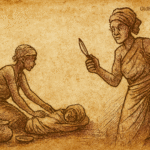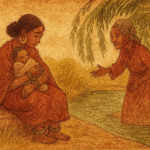In a time of famine, when the sun scorched the fields and the land offered little to eat, there lived two neighboring families. One man was wealthy, owning many cattle, while the other was poor, struggling to feed his household. The rich man, noticing the hunger of the poor, said kindly, or so it seemed, “Come, let us kill a cow from my herd, that we may share it.” They butchered the cow, and for three days, they ate together the stomach, entrails, and all the interior parts.
The good cuts of meat, however, were carefully set aside and dried. The rich man kept these pieces for himself, while the poor family endured three evenings of fasting, their hunger gnawing at their patience and pride. Seeing this, the poor man’s clever wife devised a plan. She whispered to her husband, “Do as I say. Pretend to be angry, call me ‘son of a gun,’ and strike my leather skirt. I shall cry as if in pain, and the neighbors will be drawn into the act.”
The husband, though puzzled, obeyed her instructions. Their wealthy neighbors, who had previously prevented them from accessing the prime meat, came over to mediate, hoping to ease tensions. Yet the husband, playing his wife’s part in the ruse, threatened them with feigned anger: “If this woman does not leave my house, I shall not rest until I take some action against her!” Alarmed, the neighbor urged the wife to enter their house for safety, and she agreed, stepping into the dwelling of her affluent counterparts.
Once inside, the wife noticed the net-basket where the dried meat was stored, hanging just out of reach. Yet it was tightly secured, and no tool seemed available to open it. She spoke to her husband through the window, a whispered plea for guidance: “How shall I open this basket, and with what shall I cut it?” He responded discreetly, “Use the knife that lies on the edge of the bed; it will serve your purpose.”
READ THIS: The Tale of the Elephant, the Leopard, and His Son: Tigrean Folktale of Misplaced Revenge
Following his instructions, she seized the knife, cut open the net-basket, and carefully took some of the dried meat. Meanwhile, the household’s men were busy calming the husband, unaware of the theft occurring right under their noses. When the husband’s anger had seemed appeased, he signaled the neighbor: “Now, let her return to her house for your sake; otherwise, I might have driven her away.”
Carrying the stolen meat, the clever wife returned home. She and her husband cooked it and shared a nourishing meal, their bellies finally satisfied, and their spirits lifted. When the other family returned to inspect their store of dried meat, they discovered it missing. In this way, the poor couple had outsmarted their wealthier neighbors, securing sustenance and proving that cleverness and cunning could triumph over simple wealth.
Moral Lesson
This story teaches the value of ingenuity and resourcefulness in overcoming hardship. Wealth alone does not guarantee success; intelligence, planning, and subtle action can empower the less fortunate to prevail. Even in times of scarcity, careful thought and courage can turn a disadvantage into a triumph.
Knowledge Check
Who were the main characters in this folktale?
The poor husband, his clever wife, and the wealthy neighbors.
What event prompted the wife’s clever plan?
A famine that left her family hungry while the neighbors hoarded the good meat.
How did the wife retrieve the dried meat?
She spoke secretly with her husband and used the knife on the bed to open the net-basket.
What does the folktale symbolize about wealth and intelligence?
That intelligence and strategy can triumph over mere wealth.
What cultural origin does this tale come from?
Tigrean, Eritrea.
What lesson does the folktale teach about problem-solving?
Creativity, planning, and clever action are essential tools for overcoming adversity.
Source: Tigrean folktale, Eritrea
